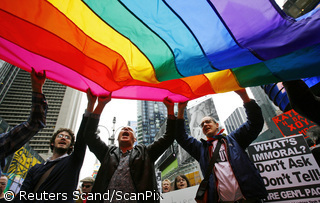Russia Exhibits Hitler's Skull before Victory Day.
Published:
28 April 2000 y., Friday
Russia geared up on Wednesday for the 55th anniversary of the end of World War Two, a major holiday commemorating more than 20 million dead, with an exhibition featuring what experts say is part of Adolph Hitler's skull. Officials unveiled an exhibition of artifacts entitled "The Agony of the Third Reich - Retribution" with the skull fragment as centerpiece of what they hoped would provide a new vivid image for the victory of the Red Army and its Western allies.
Archivists said Hitler's dentist provided proof that the skull, recovered by the Red Army and brought to Moscow in 1946, was that of the Nazi leader, who committed suicide in his Berlin bunker as Allied forces closed in on Berlin.
"I am convinced this part of Hitler's skull is proof that Hitler got his just deserts," Sergei Mironenko, head of Russia's State Archives, told reporters."He wanted to escape retribution, but it got him. Did he really want to end his life in a bunker with a bullet hole in his skull? I don't think so."
Documents show Hitler committed suicide, along with his mistress Eva Braun on April 30, 1945, in a bunker beneath his Berlin chancellery. Archivists said most of his remains were kept in East Germany and cited a March 1970 note by the Soviet Communist Party's Central Committee noting they were burned before land where they were stored was turned over to local authorities.
Copying, publishing, announcing any information from the News.lt portal without written permission of News.lt editorial office is prohibited.
The most popular articles
 Tiwonge Chimbalanga and Steven Monjeza are married, but in Malawi homosexuality is banned.
more »
Tiwonge Chimbalanga and Steven Monjeza are married, but in Malawi homosexuality is banned.
more »
 The World Bank today launched the fourth book in the critically acclaimed Moving Out of Poverty series, which provides bottom up perspectives on poverty and local realities by over 60,000 people living in 500 communities in 15 countries.
more »
The World Bank today launched the fourth book in the critically acclaimed Moving Out of Poverty series, which provides bottom up perspectives on poverty and local realities by over 60,000 people living in 500 communities in 15 countries.
more »
 Ten years ago, European leaders pledged to end poverty in the EU by 2010. As this deadline approaches, the goal is still some way off.
more »
Ten years ago, European leaders pledged to end poverty in the EU by 2010. As this deadline approaches, the goal is still some way off.
more »
 For many 2009 will be a historic year with the coming into force of the Lisbon Treaty, the outcome of the Copenhagen summit and the inauguration of the first black US president.
more »
For many 2009 will be a historic year with the coming into force of the Lisbon Treaty, the outcome of the Copenhagen summit and the inauguration of the first black US president.
more »
 Not answering the phone, celebrating Hogmanay and reading Dickens' Christmas Carol are just three seasonal traditions that MEPs shared with us.
more »
Not answering the phone, celebrating Hogmanay and reading Dickens' Christmas Carol are just three seasonal traditions that MEPs shared with us.
more »
 More and more people make their homes and own property in EU countries other than the one in which they hold citizenship.
more »
More and more people make their homes and own property in EU countries other than the one in which they hold citizenship.
more »
 European Parliament President Jerzy Buzek has made an televised Christmas and New Year address to European citizens, looking ahead to the challenges of the coming year.
more »
European Parliament President Jerzy Buzek has made an televised Christmas and New Year address to European citizens, looking ahead to the challenges of the coming year.
more »
 Lithuania takes the 1st position in the EU by the number of students in the country.
more »
Lithuania takes the 1st position in the EU by the number of students in the country.
more »
 Sergei Kovalev, former political prisoner turned activist for Russian human rights group Memorial gave an emotional and heartfelt address to the European Parliament on Wednesday 16 December.
more »
Sergei Kovalev, former political prisoner turned activist for Russian human rights group Memorial gave an emotional and heartfelt address to the European Parliament on Wednesday 16 December.
more »
 Strengthened passenger rights for travel by bus are an important item on the agenda when the Transport, Telecommunications and Energy Council (TTE) meets on 17–18 December.
more »
Strengthened passenger rights for travel by bus are an important item on the agenda when the Transport, Telecommunications and Energy Council (TTE) meets on 17–18 December.
more »